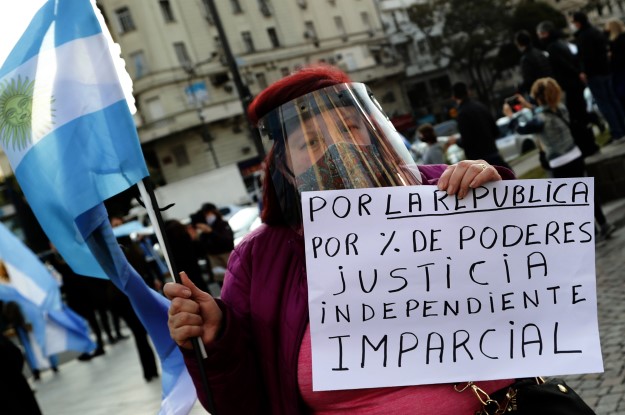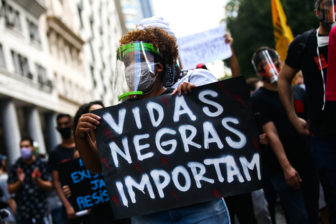BUENOS AIRES – President Alberto Fernández of Argentina has announced a major judicial reform bill, arguably the most ambitious of its kind since the 1990s. But Argentina’s intense political polarization threatens to derail the debate, leaving the country without a sound alternative to its dysfunctional justice system.
Argentina’s deep political divide, known as la grieta, dominates almost every public debate in the country, and the debate over judicial reform has been no different. But amid the slogans, accusations and fake news – from both sides – we miss looking at what really matters: Is the proposal at hand a good or a bad reform? Will it foster impunity, or will it help strengthen rule of law?
The president’s critics have attacked the reform’s procedural elements, namely its timing and deliberation. Of course, as many have argued, it would be better to discuss a judicial reform in a less extreme situation, when we are not absorbed by the demands of a global pandemic. However, it is also true that Argentina lives in permanent emergency, so there may never be an ideal time to pass judicial reform. Accepting the status quo, meanwhile, means leaving in place a system lacking transparency, efficiency, access, equal treatment and independence. We can’t just look the other away. Is anyone willing to say that, after passing through the legislative process, Fernández’s reform would be worse than what we have right now? It’s unlikely.
While there’s criticism that Fernández’s reform did not receive the appropriate level of deliberation before being sent to Congress, it’s also true that not every part of the reform has been sent to the legislature. Fernández has commissioned a diverse group of experts to submit a separate reform proposal on some of the most sensitive issues affecting Argentina’s judicial system.
Further, any reform bill will also go through a large debate in Congress, with scholars, judges, prosecutors and NGOs being summoned to share their opinions with lawmakers and in front of the media. Nationwide debates in public squares and universities would be ideal, but there has to be middle ground. The choice can’t be between the perfect process or the status quo.
Ultimately, what matters more than procedural issues is the final reform. Fernández’s proposal, as it is now, includes many changes that would greatly improve Argentina’s justice system. The reform would establish an accusatorial criminal system, in which judges serve as impartial referees in a case managed by prosecutors. In 2015, under President Mauricio Macri, Argentina cancelled the accusatorial system’s entry into force, thus maintaining a mixed system in which judges instigate cases and lead investigations, the only country in Latin America following this system at the federal level.
Fernández’s reform would also transfer non-federal crimes within the City of Buenos Aires from the federal criminal system to the local judiciary. This is needed because the city was conferred autonomy (similar to a province) in the 1994 constitutional amendment. The judicial reform would also create new federal criminal courts both in the capital and in the provinces, thus addressing the huge concentration of power in the hands of a small number of judges and prosecutors. The current scenario allows federal judges and prosecutors to push or delay cases as they see fit, elevating certain interests over the rule of law, often under pressure from powerful public or private parties. This is what Fernández rightly calls “pendular justice.”
The reform would also require that exams for new judicial appointees be recorded and made public, that personal interviews have a maximum 15% bearing on the total score, and that gender perspective be evaluated.
Still, the reform submitted by Fernández does not adequately address the Argentine judiciary’s main deficit: its lack of independence from both political and economic powers. It does not substantially change the way judges and prosecutors are selected and removed from office. The reform does not target the absolute lack of accountability that these officials currently have, much less does it put transparency or social monitoring mechanisms in place. It would also leave the main institution responsible for the judiciary’s lack of independence, the Judicial Council, untouched for a long time, since its reform is not part of the bill but will rather be studied by the experts council.
The judicial reform’s biggest flaw is that it will most likely expand Alberto Fernández’s powers to select new judges, public defense attorneys and prosecutors just as Vice President Cristina Fernández de Kirchner and many of her former high-level officials face criminal charges for corruption (mostly brought during Macri’s administration). In line with “pendular justice,” some of these charges have already begun to fade, while cases against Macri and his officials – once neglected during his government – have suddenly blossomed.
This all puts an extra burden on the president to demonstrate fairness and transparency as the reform is debated. Not doing so would fuel accusations that the reform is a partisan project, rather than a necessary overhaul of a system that for decades has either fostered impunity or used corruption as an excuse to infringe fundamental rights.
But while most judicial reforms in the recent past have served to enlarge political and economic influences, they haven’t all done this. In 2003, then-President Néstor Kirchner made a groundbreaking decision to tie his own hands through an executive order that devised a non-mandatory participatory procedure allowing NGOs and citizens at large to comment on candidates for Supreme Court justices before their names were submitted to the Senate for approval. Fernández, who played a role in that decision as Kirchner’s cabinet chief at the time, referenced it when announcing his own judicial reform bill.
By emulating the philosophy behind this decision, the president could substantially increase the legitimacy of any reform proposed by the experts council allowing civil society to weigh in through a notice and comment procedure, or even, if it comes to increasing the Supreme Court’s members, by leaving at least half of the new Justices for the next administration to name. Such an approach would be an important step in moving Argentina’s justice system in the direction of efficiency, impartiality and the rule of law.
—
Volosin is an Argentine attorney. She holds an LL.M. and a J.S.D. from Yale Law School and is the author of Corruption in Argentina: Towards an Institutional Approach (Routledge 2019).








